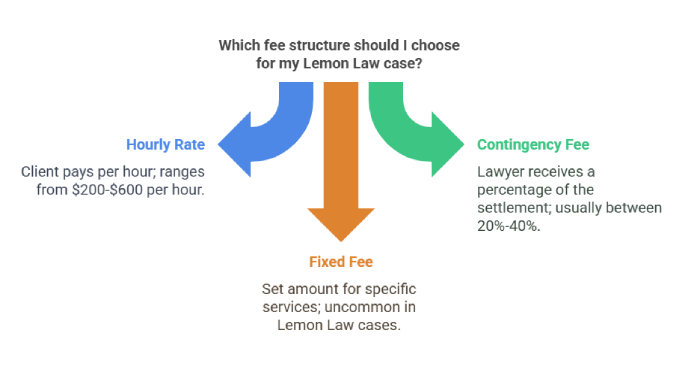If you’ve ever bought a new car only to find it behaves more like a stubborn mule than a smooth ride, you’re not alone. Many people find themselves frustrated by vehicles that seem to be more trouble than they’re worth. That’s where California’s Lemon Law comes in, designed to protect consumers from persistent vehicle defects. But navigating the legal process can be tricky, especially when it comes to understanding attorney fees. In this guide, we’ll cover everything you need to know about hiring a San Diego Lemon Law lawyer, helping you protect your rights and avoid unexpected costs under California’s Lemon Law. Understanding these expenses is essential for making informed decisions and gaining peace of mind as you navigate your lemon law case.
In California, lemon law attorneys often work on a contingency fee basis, meaning they only get paid if you win your case, typically taking around 25% to 40% of the settlement amount. It’s essential to discuss the fee structure upfront during the initial consultation to understand your financial obligations fully.
Overview of California Lemon Law Attorney Fees
When dealing with a Lemon Law case in California, understanding attorney fees is crucial. These fees typically range from $200 to $600 per hour. However, many attorneys offer a flexible approach by working on a contingency fee basis, meaning they only receive payment if you successfully win your case.
This structure is primarily designed for consumer protection. The underlying principle is that you shouldn’t worry about legal costs piling up while you hope for a resolution regarding your lemon vehicle. Instead, the law holds manufacturers accountable by requiring them to cover the legal fees incurred if their product turns out to be defective. Essentially, when you win the case, the cost of hiring an attorney shifts from your pocket to the manufacturer’s.
It’s important to clarify any terms upfront since contingency fees are advantageous but vary among attorneys. Each attorney may have different rates and conditions, so before engaging their services, ensure you understand their fee structure. Some might also include provisions for additional costs such as court filing fees or expert witness fees, which can be separate from the basic attorney fee.
In essence, clarity is key! Ensuring you fully understand the financial agreement allows you to focus on your case without financial anxiety clouding your judgment.
Moreover, consider seeking consultations with multiple attorneys. Many Lemon Law professionals offer free consultations where they outline their fee structures in detail and discuss the specifics of your unique situation. This helps ensure their approach aligns with your needs and provides valuable insight into potential outcomes based on your case details.
Lastly, while cost considerations are essential, remember that experience matters too. A seasoned Lemon Law attorney brings expertise and insights that can streamline your case and yield better results than someone less experienced. Look for testimonials or reviews from past clients; this greatly assists in evaluating which attorney is the right fit for you.
Understanding these financial aspects not only empowers you in choosing legal representation but also prepares you for the critical role that skilled attorneys play in navigating these complex cases.
Attorney’s Role in Lemon Law Cases
The involvement of an attorney in Lemon Law cases is essential not just for legal representation but also for navigating the complexities of such claims. They become your strategic partner from the very beginning, ensuring you understand every step of the process while working diligently to achieve a positive outcome.
Investigative Steps
Initially, your attorney will review your vehicle’s repair history and all pertinent documentation. This is crucial because it helps establish whether your vehicle meets the required criteria under California’s Lemon Law, which stipulates that a car must have a significant defect covered by warranty that was not fixable after a reasonable number of attempts.
This exploratory phase is critical; without identifying key issues early on, you risk losing the case before it even begins. An experienced attorney knows what information is necessary and how to interpret technical details effectively.
Next, your attorney gathers compelling evidence and consults with automotive experts. Each piece of evidence—from repair invoices to expert testimonies—will bolster your claim. They will help articulate the ongoing problems with your vehicle and stress how these issues have impacted your life. An effective narrative combined with professional insights can significantly influence negotiations.
Negotiation and Litigation
Once equipped with adequate evidence, attorneys then transition into negotiations with the manufacturer on behalf of their clients. The goal is always to reach a favorable settlement without going to court, as this can often expedite compensation. But if negotiations stall or become unreasonable, rest assured that your attorney is prepared to file a lawsuit and pursue litigation if necessary.
Their role doesn’t stop there; they leverage their expertise in consumer protection laws throughout this entire process. A skilled attorney understands how to frame arguments and present evidence effectively in court, significantly enhancing your chances for a favorable verdict should it come to that.
The intricacies of Lemon Law can be daunting for those unversed in legal matters, but having an attorney by your side simplifies these complexities, providing peace of mind during an otherwise stressful time.
It’s their specialized knowledge and commitment that can dramatically alter the trajectory of a Lemon Law case. By investing in legal representation, you are not only gaining an advocate but also enhancing your likelihood of successfully reclaiming costs associated with your defective vehicle.
As we move forward, it’s important to examine the specific legal services offered by attorneys in these cases, which play a critical role in navigating your claim.
Legal Services Included
California Lemon Law attorneys play a vital role in navigating the complexities of consumer rights regarding defective vehicles. Their expertise amplifies your chances of a successful outcome while shielding you from potential pitfalls throughout the process.
Case Evaluation
The first essential step is case evaluation. This is where an attorney reviews your situation against California’s Lemon Law criteria to determine if your claim holds water. They will discuss your vehicle’s issues, identify patterns, and weigh any repair attempts you’ve made. This process can sometimes reveal details you may have missed, building a solid foundation for your case.
Documentation
Next comes documentation, which is anything but mundane. Your attorney will gather important records including purchase agreements, repair orders, and maintenance logs. Every piece of evidence counts in establishing the legitimacy of your claim. Proper documentation can make or break a case; thus, having a professional manage this task alleviates stress and ensures completeness.
Communication
Once the foundational work is laid, the attorney will engage in communication on your behalf. This involves handling all correspondence with the vehicle manufacturer—a task that might seem simple but can quickly become complicated. Manufacturers are often challenging to deal with; they may send confusing terms or deny claims repeatedly. With an experienced attorney, you have someone who knows how to effectively communicate and advocate for your rights.
Negotiation
Following communication, negotiations come into play. Through negotiation, your lawyer actively seeks a favorable settlement without the need for further court action. This part of the process requires both skill and finesse; a skilled negotiator can assess when to push harder or when to accept an offer that could be beneficial for you as the client.
Litigation
Finally, should negotiations fail to reach a satisfactory resolution, the last resort becomes litigation. An attorney will represent you in court, laying out your case before a judge or jury. This stage requires thorough preparation and understanding of legal procedures; hence having an attorney by your side significantly boosts your confidence in facing such challenges.
These services form a cohesive strategy designed to maximize your potential for success under the Lemon Law. Each aspect plays a crucial role in ensuring that your rights as a consumer are upheld throughout the journey.
With these essential legal services outlined, let’s now explore how the associated fees for these services are calculated and what factors impact these costs.
How Fees Are Calculated
When it comes to California Lemon Law attorney fees, understanding how those fees are calculated is essential. Most attorneys operate under either an hourly rate or a contingency fee structure. This distinction influences how much you’ll ultimately pay and can impact your overall satisfaction with the process.
In a traditional hourly rate arrangement, you are billed per hour for the attorney’s services. Depending on experience and geographical location, these rates can range from $200 to as much as $600 an hour. If a case demands more hours due to complexity or extended negotiations, your bill can quickly escalate. It’s not just about the hours logged on your invoice; you’re also paying for the expertise behind each minute they work on your behalf.
Conversely, in a contingency fee arrangement, the attorney’s payment is directly tied to the outcome of your case. Typically, this means they receive a percentage—usually between **20% and 40%**—of any settlement or judgment awarded. This type of fee structure can feel less intimidating since you won’t owe anything upfront, but it means you’ll be sharing a significant portion of your successful outcome with your attorney.
It’s important to note that some attorneys might offer a fixed fee for certain services, although this is less common in Lemon Law cases due to their inherently unpredictable nature. For instance, you might find a flat fee for initial consultations or basic advice, but anything beyond that tends to revert back to hourly or contingency arrangements.
The choice between these options often depends on your financial circumstances and risk tolerance. If you’re confident in the strength of your case and prefer not to incur costs upfront, a contingency arrangement could be beneficial. On the other hand, if you’d like more predictability regarding expenses and have budgeted accordingly, going with an hourly rate might make more sense for you.
As you consider these varying structures, it becomes vital to think about how different fee models may align with your specific needs and expectations when seeking legal representation.
Comparing Fee Structures
Not all fee arrangements are created equal, and understanding the differences can greatly affect your experience and financial responsibilities when working with California Lemon Law lawyers. The two most common fee structures—hourly rates and contingency fees—each come with their own advantages and disadvantages that can shape your decision-making process.
Hourly Rate vs. Contingency Fee
An hourly rate generally involves paying your attorney for each hour of service rendered. While this method offers clear transparency and allows you to see exactly how much time is being spent on your case, it can lead to higher costs if your case extends over a longer period. Take, for example, a situation where unforeseen complications arise; those additional hours can accumulate quickly, leading to unexpected expenses. Therefore, if you anticipate a lengthy legal process, this structure may require careful budgeting.
On the other hand, a contingency fee arrangement can be particularly appealing for those who are concerned about upfront costs.
With a contingency fee structure, clients typically pay no fees unless they win their case. This model can be less daunting for clients who might struggle to cover legal fees upfront yet still desire robust representation. However, it’s essential to understand that in return for this flexibility, you may end up paying a percentage of your settlement as attorney fees. Depending on the agreement, this could range between 25% and 40%. For many, this is acceptable considering that you won’t have any initial financial burden while pursuing justice—an aspect especially beneficial for those with limited financial resources.
It’s worth considering not just the immediate implications of these fee structures but also how they reflect your long-term financial outlook after resolving your case.
Regardless of which option you choose, it’s prudent to establish clear communication with your attorney regarding their billing practices. A reputable lawyer will always clarify their fee structure upfront, ensuring you’re fully aware of how you’ll be charged throughout the process. Additionally, investigate whether there are any hidden costs or fees that could unexpectedly inflate your total expenses down the line.
Selecting the right fee structure is influenced by personal circumstances and preferences; understanding how each one works can help guide your decision effectively. With this foundation laid out, we now turn to explore how securing skilled legal assistance can enhance your position during these proceedings.
Benefits of Legal Representation
Legal representation in Lemon Law cases offers several distinct benefits that go beyond mere assistance in paperwork. Imagine standing before an opposing party, feeling overwhelmed and underprepared. Now imagine having a seasoned attorney beside you—someone equipped with experience, knowledge, and the power to advocate for your rights. This peace of mind is invaluable; it empowers you to navigate what may otherwise be a complex and intimidating process.
One key advantage is expertise. Lemon Law is filled with intricate rules and regulations that can confuse anyone not trained in the field. Attorneys who specialize in this area have taken the time to familiarize themselves with state-specific laws, enabling them to provide tailored guidance. They understand what constitutes a “lemon” and can identify specific consumer protections applicable to your situation. Such clarity can be pivotal in moving forward effectively.
Even seemingly straightforward cases can benefit from the expertise of a seasoned attorney, as they are adept at spotting nuances that an untrained eye might miss.
Next comes negotiation skills. Lawyers have spent years honing their ability to negotiate settlements and advocate on behalf of their clients. This experience proves crucial when it comes to securing favorable terms, whether it’s through direct negotiations or during mediation sessions. An experienced attorney knows how to leverage facts and figures that could sway the opposition’s perspective, allowing them to push for settlements that reflect the true value of your claim.
Yet another benefit that’s often overlooked is resource accessibility. Hiring an attorney means gaining access to a network of expert witnesses—mechanics, engineers, or industry professionals—who can lend credence to your case. In many cases, these experts are essential for verifying claims about the vehicle’s defects or failures. Additionally, lawyers have access to comprehensive databases that can enhance case preparation significantly, including prior case outcomes, which can help determine strategies for success.
Furthermore, many consumers report feeling more confident and less stressed knowing they have professional support on their side. The emotional relief that comes from knowing someone experienced is advocating for you cannot be overstated; it transforms what could feel like an insurmountable battle into a manageable process.
Navigating Lemon Law disputes without legal representation may leave you vulnerable; thus, it’s wise to consider various strategies and supports available outside the courtroom setting. With this understanding in mind, we can now explore the alternative approaches available for addressing such challenges.
Exploring Non-Legal Options
One of the first steps in resolving your vehicle problems without resorting to legal action is to reach out to the manufacturer’s customer service. This may seem like a simple approach, but contacting them directly can sometimes yield impressive results. When you communicate with customer service, be clear and specific about the issues you’re facing with your vehicle. Document your concerns diligently, as this log will serve as a reference should you need to escalate your case later. You might be surprised at how often manufacturers are willing to offer repairs, replacements, or even buybacks when directly approached.
It’s important to remain calm during these conversations; expressing frustration or anger can lead to unproductive exchanges. Instead, frame your questions positively and express your desire for resolution. Often, a friendly but assertive approach can occur within established warranty processes without further ado.
Mediation Services
If support from the manufacturer fails to deliver a satisfactory resolution, California Lemon Law mediation offers a valuable alternative. Through this process, many legal firms provide expert guidance while involving a neutral third party to facilitate productive communication between you and the manufacturer. Mediation creates a space for open dialogue, allowing both sides to share their perspectives without the formality and pressure of a courtroom. This method is often faster and more cost-effective than litigation, helping to ease stress and promote a fair resolution for all parties involved.
While mediation can sometimes lead to viable agreements, it’s important to keep in mind that it does not guarantee success every time. The effectiveness of mediation heavily depends on both parties’ willingness to collaborate towards a solution.
As you navigate these non-legal avenues, remember that exploring alternatives like customer service outreach and mediation could save you both time and money while avoiding the complexities associated with legal representation. However, there may be situations where pursuing legal action becomes crucial if these options fail; understanding when to switch gears is essential during this process.
With effective alternatives laid out before you, it’s imperative now to look at how to identify and engage with an attorney who specializes in lemon law cases.
Selecting a Qualified Lemon Law Attorney
The journey through a Lemon Law claim can be overwhelming, and having the right attorney significantly influences the outcome of your case. Therefore, selecting a qualified attorney is pivotal and demands careful consideration. Start by prioritizing credentials and experience.
Attorneys who specialize in Lemon Law cases not only have an in-depth understanding of relevant statutes but can also apply their knowledge practically. Look for those who have handled numerous cases similar to yours, as this experience equips them with insights into potential challenges and effective strategies. Verify their credentials by checking their membership in state bar associations, which assures you that they are licensed professionals adhering to ethical guidelines.
Having the right qualifications is vital, but understanding what clients say about their attorneys can shed light on their effectiveness.
Client Testimonials
As you research potential lawyers, do not overlook client testimonials, as they reveal essential information about an attorney’s strengths and weaknesses. Online reviews are easily accessible, but digging deeper into referrals can provide even more valuable insights.
Seek firsthand accounts from past clients—these conversations can illuminate the attorney’s communication skills, both in terms of responsiveness and clarity. Engage with former clients about their experiences: Were they kept adequately informed? Did the attorney display genuine interest in their case? These inquiries help create a holistic picture of what working with a specific lawyer might be like.
After gathering enough feedback, it’s time for the practical step of interviewing candidates who seem promising.
Schedule Consultations
Meeting with multiple attorneys allows you to gauge their approach and expertise directly. During these consultations, prepare specific questions related to your case. Inquire about their familiarity with Lemon Law claims and how they plan to tackle potential obstacles you might face.
This dialogue isn’t just about finding an attorney; it’s also about assessing whether you feel comfortable sharing personal details with them since trust plays a critical role in any attorney-client relationship. A good attorney not only listens but engages actively with your concerns and provides clear answers, reflecting both confidence and dedication.
Ultimately, an attorney’s specialized focus on Lemon Law cases often correlates with greater success rates for clients seeking resolution.
Focused Practice
Many individuals find that attorneys concentrating specifically on Lemon Law cases are more adept at navigating its complexities compared to general practitioners. This concentrated practice means they’re up-to-date on recent developments in laws or legal precedents that might affect your case.
Their familiarity with how these nuances impact negotiations or litigation strategies often translates into better outcomes for clients.
Choosing a qualified Lemon Law attorney involves more than simply picking someone off a list; it requires due diligence in researching credentials, client reviews, consultation interactions, and specialization areas. By putting in this effort upfront, you position yourself strongly for success as you pursue your claim.
Are there any upfront costs when hiring a lemon law attorney?
Yes, there can be upfront costs when hiring a lemon law attorney, although many operate on a contingency fee basis, meaning they only get paid if you win your case. Some attorneys might charge for initial consultations or request retainer fees, which can vary widely based on the complexity of your case and the attorney’s experience. According to statistics, over 75% of lemon law cases are resolved without going to court, making these initial costs relatively low in comparison to potential settlements that can significantly outweigh any fees incurred.
How do I know if the fees are reasonable or competitive compared to other attorneys?
To determine if the fees charged by a California Lemon Law attorney are reasonable or competitive, you should conduct a market comparison by gathering quotes from multiple attorneys specializing in lemon law cases. Review their fee structures, which may include hourly rates or contingency fees—typically ranging from 25% to 40% of your recovery amount. Additionally, consider reading client reviews and checking their success rates; for instance, a firm with a 90% success rate may justify higher fees due to proven results. It’s also wise to ask for a detailed breakdown of costs and any potential hidden charges to ensure transparency in their billing practices.
Can I recover my attorney’s fees if I win my lemon law case?
Yes, under California’s Lemon Law, if you prevail in your case, you are typically entitled to recover your attorney’s fees and costs. This provision is in place to ensure that consumers can seek rightful compensation without the burden of legal expenses deterring them. In many successful lemon law cases, parties have been awarded substantial reimbursements for their legal fees, which can range widely depending on the complexity of the case and the hours spent by the attorney. Statistically, most plaintiffs who secure a favorable ruling also receive their attorney’s fees covered, reinforcing the law’s intention to protect consumers.
What is the typical fee structure for a lemon law attorney in California?
The typical fee structure for a lemon law attorney in California often operates on a contingency basis, meaning that the lawyer only gets paid if you win your case, typically receiving 25% to 40% of the recovery amount. This aligns with the trend where consumers are provided access to legal representation without upfront costs, as about 90% of lemon law cases end in settlements favoring the consumer. Additionally, attorneys may charge for costs incurred during litigation, though these can sometimes be recovered from the losing side.
What factors influence the total cost of legal representation in a lemon law dispute?
The total cost of legal representation in a lemon law dispute is influenced by factors such as the complexity of the case, the attorney’s experience and hourly rate, and whether the case goes to trial or is settled out of court. For instance, cases that require extensive research or expert testimony can significantly increase costs. On average, lemon law attorneys may charge between $150 to $500 per hour, depending on their expertise, with successful claims often resulting in recoveries that can exceed $10,000, potentially covering legal fees through settlements or judgments.







